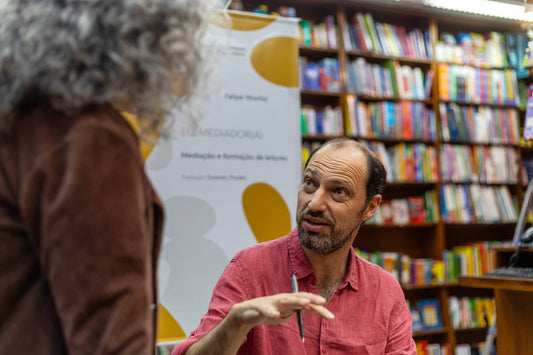Victor Mascarenhas critica a decadência de Salvador e o mito da "baianidade para turista ver" em romance com forte sotaque gregoriano
As citações a Antonio Risério, em crítica do antropólogo à obrigação do soteropolitano ser feliz os 365 dias do ano e à carta de demissão do governador-geral e fundador de Salvador, Tomé de Souza, que, de forma comovente, implorou a D. João III para dispensá-lo do pesado cargo, sinalizam o que o leitor irá encontrar nas breves 80 páginas de Xing Ling – Made in China, primeiro romance do escritor e roteirista Victor Mascarenhas, lançamento da Solisluna Editora.
Seja no ritmo caudaloso das palavras ou no tom revoltado e panfletário, de nítida conotação política, embora apartidária, o livro remete aos versos de escárnio do poeta colonial Gregório de Mattos, mas sem deixar de recordar o deboche do velho Cuíca de Santo Amaro, que, quando encarapitado em caixotes de feira, disparava farpas contra os poderosos da “Cidade da Bahia” em inspirados cordéis.
Xing Ling é anárquico até no nome, que faz referência às quinquilharias tecnológicas pirateadas pelos chineses. Mas, nem por isso, deixa de expor as feridas de uma Salvador em vias de desintegração. O livro, embora entretenha com seu tom escrachado e a narrativa mirabolante de filme de aventura, tem um objetivo mais sério: abrir consciências, tanto quanto a droga sintética Eparrey!, arma utilizada por um grupo de guerrilheiros esfarrapados no combate ao sistema – aqui representado pela grande indústria do entretenimento baiano – que envolve e espreme a cidade idealizada pelos portugueses para representar o poder da Coroa no Atlântico, tal qual os tentáculos de um polvo gigante.
Em resumo, a obra se passa em um futuro hipotético, quando o Pelourinho – patrimônio arquitetônico e cultural da humanidade pela Unesco – é transformado por um conglomerado empresarial chinês, numa espécie de Costa do Sauípe Intramuros do Dendê. O Centro Histórico, núcleo original da fundação de Salvador, é metaforizado no coração da capital, logo, em uma espécie de centro de força gravitacional de seu povo.
O “Pelô” de Xing Ling está cercado por muralhas e fossos eletrificados que mantêm a população nativa afastada, enquanto turistas estrangeiros e endinheirados abrem as bocas entediadas diante das suntuosas igrejas barrocas. Arte sacra, baianas, capoeiristas e toda a sorte de personagens míticas daquele cenário medieval, que embasbacavam cronistas e viajantes estrangeiros, como Maria Graham e Maximiliano da Áustria em tempos idos, e que inspiraram Jorge Amado, agora não passam de imitações em plástico ou atores contratados e controlados por chips para divertir os “gringos”.
Do lado de fora dos muros, um grupo de nativos se organiza e, usando a Eparrey! como o comprimido vermelho de Matrix (a referência à saudação a Iansã e à transcendência do Candomblé não são meras coincidências), tentam retomar o coração de Salvador e devolvê-lo ao seu povo, instaurando uma guerra civil para resgatar a identidade legítima dos baianos e abolir as distorções de uma baianidade fake.
Não faltam ironias disparadas contra os partidos de esquerda ou direita que se sucedem no poder e rateiam a cidade ora para um grupo empresarial, ora para outro. E, tampouco, o livro deixa de tocar nos males advindos da pasteurização da cultura baiana e sua reembalagem tipo exportação. Sobram tiros de Eparrey! para a axé music e seus ritmos derivados e para o fundamentalismo religioso que ameaça liberdades civis. Não deixa de haver, ainda, a crítica amargurada contra os próprios soteropolitanos, que, passivos e anestesiados (como a população descrita em Admirável Mundo Novo e suas doses de Soma) pela promessa de “eterno Carnaval”, assistem a transformação da cidade em um monstrengo de aço, vidro, engarrafamentos caóticos e injustiça social.
Xing Ling, com seu desfecho surpreendente e em aberto, é um desabafo pessoal de seu autor, mas que pretende representar os anseios coletivos de uma população que perdeu a si mesma nos exotismos da própria cultura.
Victor Mascarenhas é escritor e roteirista. Autor de livros, Cafeína, de contos e vencedor do Prêmio Braskem de Cultura e Arte de 2008, e A insuportável família feliz, em 2011, após ser um dos finalistas do Prêmio Off Flip, que ocorre em paralelo à Festa Literária Internacional de Paraty. Pela Solisluna ele publicou Xing Ling - Made in China e Um Certo Mal Estar.
No cinema, foi um dos roteiristas de Esses Moços (2010, José Araripe Jr.).
Resenha publicada no blog de literatura do portal A Tarde






